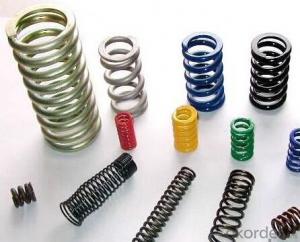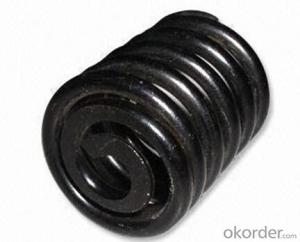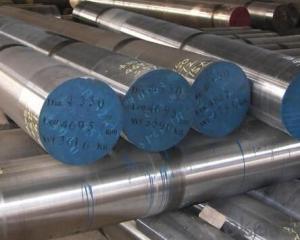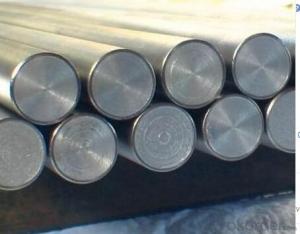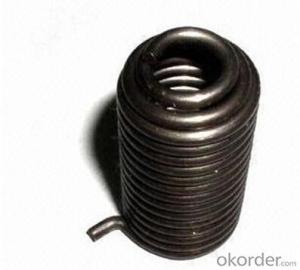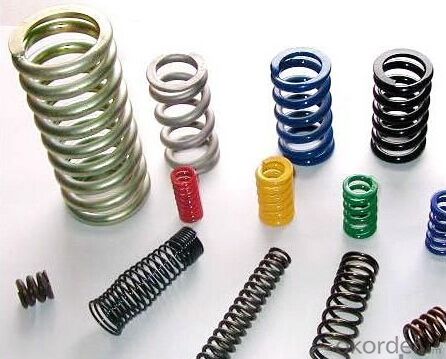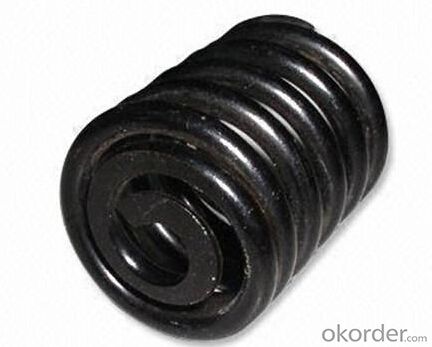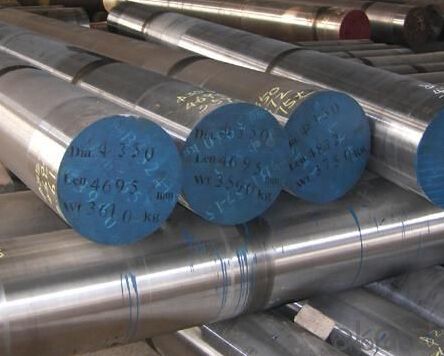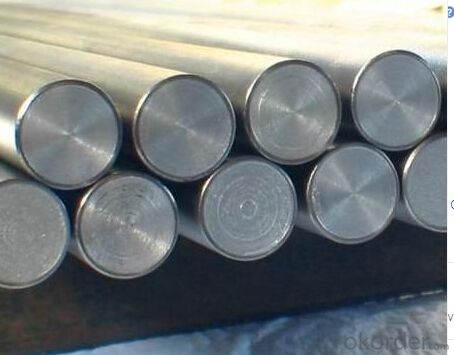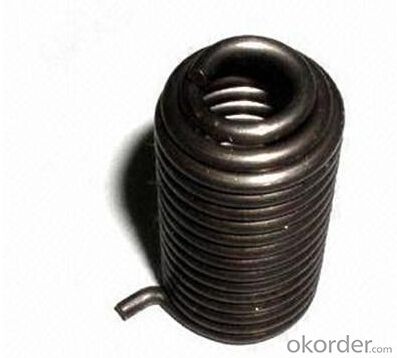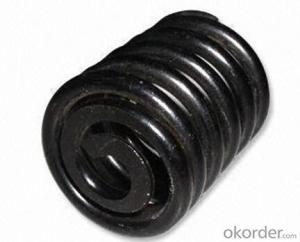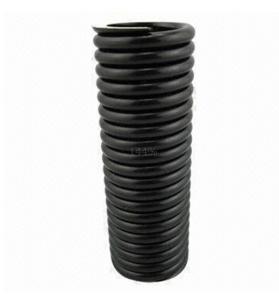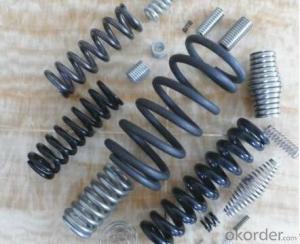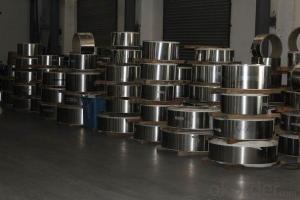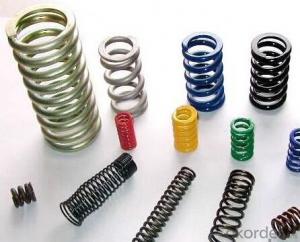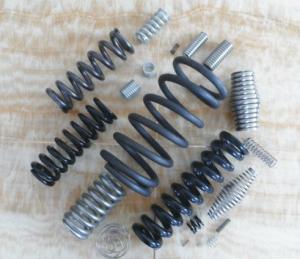Stainless Steel Compression Spring
- Loading Port:
- China Main Port
- Payment Terms:
- TT or LC
- Min Order Qty:
- -
- Supply Capability:
- -
OKorder Service Pledge
OKorder Financial Service
You Might Also Like
Product Description:
OKorder is offering Stainless Steel Compression Spring at great prices with worldwide shipping. Our supplier is a world-class manufacturer of steel, with our products utilized the world over. OKorder annually supplies products to European, North American and Asian markets. We provide quotations within 24 hours of receiving an inquiry and guarantee competitive prices.
Product Applications:
Stainless Steel Compression Spring are ideal for structural applications and are widely used in the construction of buildings and bridges, and the manufacturing, petrochemical, and transportation industries.
Product Advantages:
OKorder's Stainless Steel Compression Spring are durable, strong, and resist corrosion.
Main Product Features:
· Premium quality
· Prompt delivery & seaworthy packing (30 days after receiving deposit)
· Corrosion resistance
· Can be recycled and reused
· Mill test certification
· Professional Service
· Competitive pricing
Product Specifications:
Features of Heavy Duty Compression Spring:
1) Easily adjusted in coil diameter and pitch
2) Major materials: music wire, stainless
Features:
1) Easily adjusted in coil diameter and pitch
2) Major materials: music wire, stainless steel wire, oil tempered wire, spring steel
3) Different wire diameters, such as Ø4.0mm, 5.0mm, 8.0mm and 12.0mm
4)What kind of shape compression spring we can do for you?
Spring shape: Conical, Round and Rectangular, Hourglass, Barrel, Constant Pitch, Variable Pitch etc. see picture below
Product Information | |
product name | Heavy Duty Piston Compression Spring |
brand name | YD |
model number | YD009 |
certificate | ISO9001,RHOS |
material | carbon steel,alloy spring steel,music wire steel,and stainless steel,iron,plated steel,alloy steel,bronze,red bronze,phosphor copper,and beryllium copper;etc |
usage | car,all kinds of machines,motor,etc. |
galvanized | nickel-plated, chrome-plated, silver-plated, gold-plated, imitation gold-plated and so on or as your request |
package | all springs will be carefully packed and shipped to you with PE bags. |
payment | TT/LC |
shipment | all orders are dispatched within 7-10 business days by EMS, DHL or as your request after making payment.A Tracking Number will be sent to you via e-mail after your order has been shipped.If you do not receive the Tracking Number email within 7 business days of confirming payment, please check your spam folder and then contact us. |
PLEASE NOTE: Please allow 5-9 business days for your shipment to arrive. | |
FAQ:
Q1: Why buy Materials & Equipment from OKorder.com?
A1: All products offered byOKorder.com are carefully selected from China's most reliable manufacturing enterprises. Through its ISO certifications, OKorder.com adheres to the highest standards and a commitment to supply chain safety and customer satisfaction.
Q2: How do we guarantee the quality of our products?
A2: We have established an advanced quality management system which conducts strict quality tests at every step, from raw materials to the final product. At the same time, we provide extensive follow-up service assurances as required.
Q3: How soon can we receive the product after purchase?
A3: Within three days of placing an order, we will begin production. The specific shipping date is dependent upon international and government factors, but is typically 7 to 10 workdays.
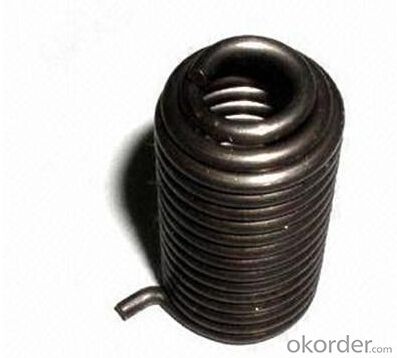
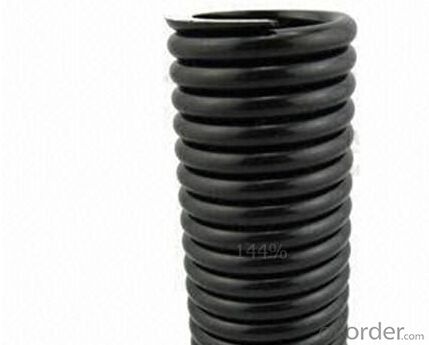
- Q: Can special steel be used in the furniture manufacturing industry?
- Yes, special steel can be used in the furniture manufacturing industry. Special steel offers various advantages such as strength, durability, and corrosion resistance, making it suitable for producing sturdy and long-lasting furniture pieces. Additionally, special steel can be molded and shaped into various designs, providing flexibility and creativity in furniture manufacturing.
- Q: Can special steel be used in marine environments?
- Yes, special steel can be used in marine environments. Special steel alloys, such as stainless steel or corrosion-resistant steel, are specifically designed to withstand the harsh conditions of saltwater and other corrosive elements found in marine environments. These alloys have excellent resistance to corrosion, erosion, and pitting, making them suitable for various marine applications, including shipbuilding, offshore structures, and marine equipment.
- Q: What are the main applications of special steel in the mining exploration?
- Special steel has various applications in mining exploration, primarily due to its exceptional strength, durability, and resistance to corrosion. It is commonly used in the construction of drilling equipment, such as drill bits and drill rods, which require high toughness and wear resistance to withstand the harsh conditions encountered during mining operations. Special steel is also utilized in the manufacturing of conveyor systems, crushers, and screens used in the processing of mined materials. Additionally, it is employed in the construction of mining infrastructure, including support structures, shafts, and tunnels, where its high strength and resistance to deformation are crucial for safety and efficiency.
- Q: What is the role of cobalt in special steel?
- Cobalt plays a crucial role in special steel as it acts as a stabilizing element, improving the steel's strength, toughness, and resistance to corrosion and wear. It also helps in retaining the steel's magnetic properties, making it suitable for applications in the aerospace, automotive, and energy sectors.
- Q: Can special steel be used in the renewable energy industry?
- Yes, special steel can be used in the renewable energy industry. Special steel, such as corrosion-resistant or high-strength steel, can be employed in various applications within the renewable energy sector. For instance, it can be used in the manufacturing of wind turbine components, solar panel frames, and hydroelectric infrastructure. The unique properties of special steel make it suitable for withstanding harsh environmental conditions and ensuring long-term durability and performance in renewable energy systems.
- Q: What are the factors that can affect the machinability of special steel?
- The factors that can affect the machinability of special steel include the composition and microstructure of the steel, the cutting tool materials and geometry, cutting conditions such as cutting speed and feed rate, the presence of cooling and lubrication, and the stability of the machining setup.
- Q: What are the common applications of special steel?
- Special steel has a wide range of applications in various industries. It is commonly used in the construction and automotive sectors for manufacturing components that require high strength, durability, and resistance to corrosion. Special steel is also utilized in the production of machinery and tools, such as cutting blades, drill bits, and gears, due to its excellent hardness and wear resistance. Additionally, it finds its application in the energy sector, particularly in the manufacturing of turbines, generators, and oil drilling equipment, where its high temperature and pressure resistance are vital.
- Q: What are the properties of corrosion-resistant stainless tool steel?
- Corrosion-resistant stainless tool steel possesses a number of key properties. Firstly, it exhibits excellent resistance to corrosion, making it highly durable and suitable for use in corrosive environments. It also has high strength and hardness, ensuring its effectiveness as a tool material. Additionally, this type of steel offers good wear resistance, enabling it to withstand repeated use without significant deterioration. Moreover, it retains its sharpness and cutting edge for extended periods, making it an ideal choice for various cutting and machining applications. Overall, the properties of corrosion-resistant stainless tool steel make it a reliable and long-lasting option for demanding industrial and manufacturing settings.
- Q: How is special steel used in the production of cutting inserts?
- The unique properties of special steel make it the ideal choice for producing cutting inserts. Cutting inserts are utilized in machining operations to shape and remove material from a workpiece. These inserts must possess the ability to endure high temperatures, resist wear and abrasion, and maintain their sharp cutting edges for extended periods. Commonly referred to as tool steel, special steel is specifically engineered to meet these requirements. It is an alloy that incorporates a variety of elements like chromium, tungsten, vanadium, and molybdenum, which enhance its mechanical properties. With its exceptional hardness, toughness, and resistance to high temperatures, special steel is a suitable material for cutting inserts. To further augment its properties, the special steel employed in manufacturing cutting inserts undergoes a series of processes, including heat treatment. This process involves subjecting the steel to specific temperatures and rapidly cooling it, resulting in increased strength and hardness. By undergoing heat treatment, the cutting inserts become capable of withstanding the extreme forces and temperatures encountered during machining operations. Moreover, special steel can be coated with materials like titanium nitride or diamond-like carbon to enhance its performance. These coatings contribute to the hardness, friction reduction, and overall wear resistance of the cutting inserts, ultimately extending their lifespan and improving efficiency. In conclusion, special steel is selected for the production of cutting inserts due to its remarkable hardness, toughness, high-temperature resistance, and wear resistance. These properties enable the cutting inserts to withstand the demanding conditions of machining operations and retain their sharp cutting edges for prolonged periods. As a result, material removal is carried out efficiently and precisely.
- Q: How is tool steel different from other types of special steel?
- Tool steel is a specific type of special steel that is designed to have exceptional hardness, strength, and durability, making it ideal for applications involving cutting, shaping, and forming materials. Unlike other types of special steel, tool steel undergoes a unique heat treatment process that enhances its properties, such as wear resistance and toughness, enabling it to withstand high temperatures and repeated use without losing its edge or integrity. Additionally, tool steel often contains alloying elements like chromium, vanadium, and tungsten, which further contribute to its exceptional performance and ability to retain sharpness.
Send your message to us
Stainless Steel Compression Spring
- Loading Port:
- China Main Port
- Payment Terms:
- TT or LC
- Min Order Qty:
- -
- Supply Capability:
- -
OKorder Service Pledge
OKorder Financial Service
Similar products
Hot products
Hot Searches
Related keywords
